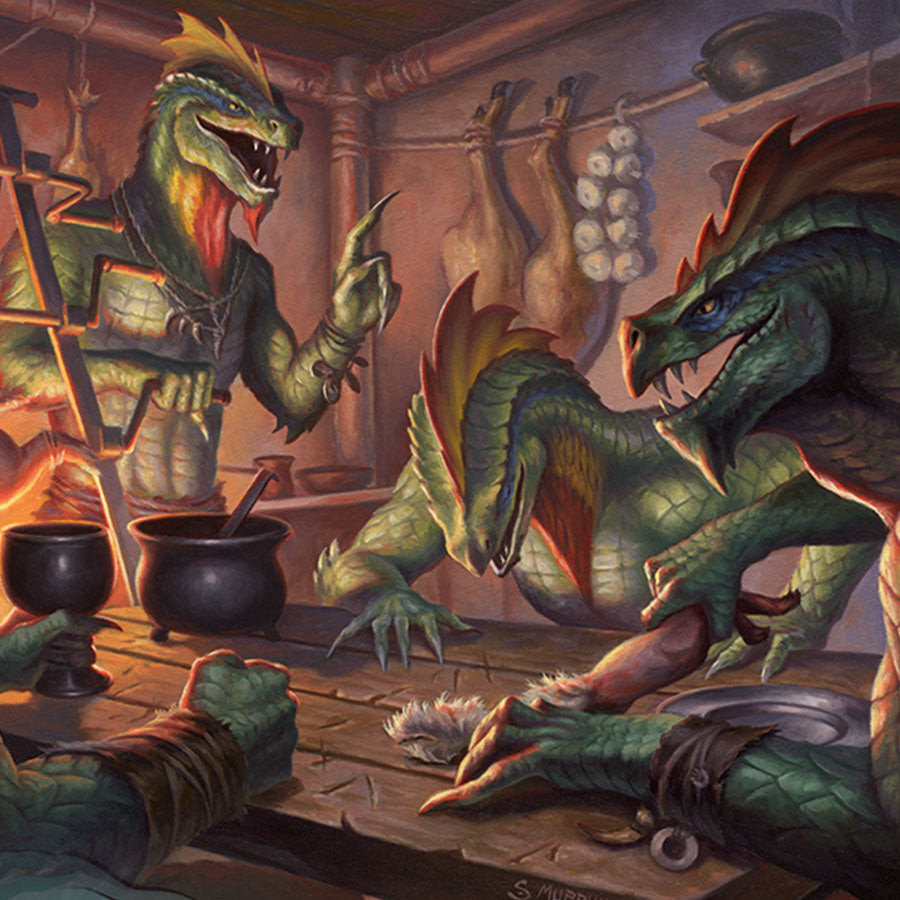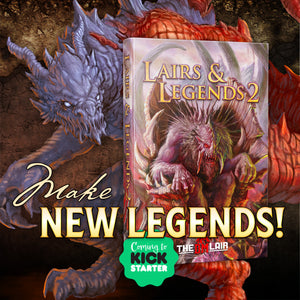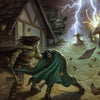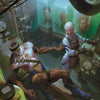How to Implement PVP in D&D

By Luke Hart
Today in the Lair, we’re going to be talking about the wonderful topic of PLAYER VERSUS PLAYER. Now we’re going to cover lots of ground today.
We’ll talk about the three basic social dynamics of RPGs – only one of which includes PVP – my observations and experiences with gameplay that involves PVP, how you might go about including PVP in your games if you choose to do so, and why I generally don’t allow PVP in my games.
By the way, are you a NEW GAME MASTER feeling a bit overwhelmed by everything involved with running a role-playing game? If so, the Secret Art of Game Mastery can help. Get over 100 years of GM experience distilled into practical, easy-to-read advice.
Watch or listen to this article by clicking the video below.
The Three Basic Social Dynamics of RPGs
To discuss player versus player intelligently, we need to look at the various social dynamics at work in an RPG such as D&D. Though this exists in most RPGs, I imagine. So, I’m going to go over some social dynamics “theory” so to speak, but it’s a good foundation for the PRACTICAL advise I’ll get into afterwards.
Alexander Macris in his book Arbiter of Worlds lays out three different ways that players interact with each other in tabletop games that conform to my observations, too.
1. Collective Play
Summarized by “one for all, all for one” mentality.
Player RPs their character with the overall good of the CAMPAIGN in mind. Their characters work together and are friendly toward each other; the players create characters that fit in with the other characters and get along. The group makes decisions collectively or as a democracy, and players will abide by them.
2. Competitive-Collective Play
Summarized by “we’re in this together, but I don’t have to like it” mentality.
Their characters work together but are NOT NECESSESARILY friendly toward each other; the players create characters that are willing to adventure with and work with the other characters, but they might have ulterior motives and not like the other characters or care about them overly much.
Player RPs their character with the overall good of the CAMPAIGN in mind, even if they would rather not OR if their character would do something else if RP’d properly. They don’t use the “that’s what my character would do” line; they don’t go there even if their PC would/should, because they still have the overall good of the campaign and other players in mind.
The group makes decisions collectively or as a democracy, and players will abide by them. Same as collective play. Group is working TOGETHER.
3. Individualist Play
Summarized by “all against all” or “every man for himself” mentality; this is the play style that ALLOWS (some might say embraces) player versus player gameplay.
Each player makes their own character, their own decisions, and accepts the consequences. The “that’s what my character would do” line is perfectly acceptable in this sort of game.
If you steal from the group and they turn on you and slit your throat, you’d better be okay with sleeping in that bed because you made it. If the rogue betrays you, steals the MacGuffin that you need to beat the final Big Bad Boss, and as a result you the Big Bad wins, you fail, and the world ends…you’d better be okay with that. If the fighter gets upset at the wizard and decides to burn his spellbook, and then the wizard drops a fireball on the fighter in the next battle…all the players had better be okay with that.
These might be extreme examples, but they give you a sense of what COULD HAPPEN in a game like this. Many times those extreme of player versus player don’t occur, but they could. And the players had better be okay with that possibility…because in my experience, there’s AT LEAST ONE player who will no doubt want to introduce some PvP chaos into the game for funsies.
My Experience
Most of the games I’ve run have used a combination of “Collective” play and “competitive-collective” play. Not because we had any lofty intellectual decisions about how we wanted to play, but because our gameplay just naturally took that course, primarily because of how I run my games. This means all players create characters that will adventure with and cooperate with the group, but they may or may not be friendly with each other. Sometimes it’s a brotherhood with a deep bond; other times it’s like forcibly getting along with co-workers because you know you have to, not because you want to. This describes the CHARACTER interactions. Not necessarily how the players feel about each other, though I imagine there was a range of feelings there, too.
However, on occasion I have had gameplay slip into Individualist play when a player decides to slip some MILD PvP into the game. Example: “Bevis” had a rogue who stole from party a lot. (Give example of Ted’s Rogue sneaking ahead taking loot; after game other player was upset about it.)
Things like this happening in my games – things that I feel are MILD PvP and not PCs outright attacking each other – taught me how PVP can affect players and lead me to these conclusions:
1. If player versus players is going to be a thing, it had better be discussed by and agreed up on by the players BEFORE the game begins. Ideally at a session zero. Decide what type of game you’re going to be playing together from the three styles I went over. And if you decide that PVP will be allowed, then all the players must agree that they won’t get upset with each other OUT OF CHARACTER when PVP occurs.
2. Many players are simply not MATURE ENOUGH to participate in an Individualist game even when everyone agrees in advance that player versus player will be part of the game. They will still get upset at each other.
3. Because of point 2, I don’t allow player versus player in my games, except in rare circumstances. Usually these are when a player and I are working together, such as (give example of Michael’s goblin and the intellect devourer). But that’s ONLY when I’m confident that the other players will be mature enough to handle the specific situation we are creating. Another example is mind control in my Youngling Group. They seem to love it when they get to fight each other in the game. Lol
My Advice Regarding PVP
So, what is my PRACTICAL advice for you? Approach PVP with extreme caution in your games.
Be aware that one of the reasons that many players LOVE RPGs like D&D is because they are NOT competitive like other games. They are NOT competing against the other players. There are not “winners” and “losers.” Instead, everyone is playing cooperatively together, and when one person “wins” everyone wins.
So, for some players, PVP will kill a part of the game that appeals to them. Thus be very aware of this and be sure to discuss as a group if PVP will be allowed or not. If you don’t get buy in from ALL the players, I would steer clear from it – or if you will be having PVP in the game, let the player know that though they are welcome to stay, it might turn out to not be the most enjoyable game for them if the PVP really gets under their skin.
If the group has agreed to NOT have PVP in the game, when you see it happening (at least one player will try to slip some in even if the group agreed not to have it), you need to step in as the game master and stop it. You remind them of the agreement the group came to regarding PVP and tell them their character can’t do that. “But Luke, player agency!!!” This is one of the cases where players do NOT have agency. If the group agree to have no PVP for very good reasons and a player tries to go there anyway, you stop them. Period, end of story. PVP isn’t allowed in the game.
NEXT, if you all decide to allow PVP, be prepared for it to blow up in your face, get players pissed off at each other, and ruin the game session, EVEN IF YOU’VE ALREADY ALL AGREED THAT PVP IS OKAY. Here’s the thing: even though part of the conversation about allowing PVP is that all players should agree that they won’t get upset with each other OUT OF CHARACTER about PVP…in my experience, not all players are mature enough to abide by that agreement. There’s always going to be at least one player who gets pissed off by a betrayal in the game from another player, and that’s going to result in a lot of drama, arguing, and sore feelings at the game table.
This is what I think: the IDEA of PVP might appeal to a lot of people. We might conceptualize it, dream about how cool it could be, read stories on Reddit about how awesome a PC betraying the group in the final Boss Fight and siding with the villain was. However, when the idea of PVP becomes an ACUTALLITY at the gametable, it often results in players upset, not having fun, and potentially walking away from the group. Remember that what looks good on PAPER is not always good IN PRACTICE.
100 Years of GM Experience at Your Fingertips!
Are you a NEW GAME MASTER feeling a bit overwhelmed by everything involved with running a role-playing game? Are you a VETERAN GAME MASTER looking for new tips and tricks to take your games to the next level? Look no further than the Secret Art of Game Mastery.
We at the DM Lair have distilled our CENTURY of accumulated GM experience into an easy-to-read guide of practical advice that you can immediately apply to your games! We've even included our own templates–the things that we use to prepare our ACTUAL games.
Get all three books to master your game:
- The Secret Art of Game Mastery. Contains over 100 years of GM advice distilled into an easy-to-read format. It introduces and explains the tools of the trade, scheduling, playstyle, post-game notes, getting player feedback, and more.
- The Secret Art of Preparation. Brings to your fingertips the actual templates and guides that the DM Lair team uses to prepare games, Lair Magazine, and more. Designed as a three-ring binder, it's intended for you to write directly into for your entire campaign!
- The Secret Art of Notetaking. Gives you the keys to tracking your campaign from session to session just like the DM Lair team. Designed as a three-ring binder, it's intended for you to write in and keep track of your whole campaign!
With so much knowledge and experience on its pages, The Secret Art of Game Mastery is guaranteed to become an indispensable tool for all game masters, new and veteran alike. And if that isn’t enough, the information applies to all game systems and all genres!
-
Posted in
Game Master How-To Articles








